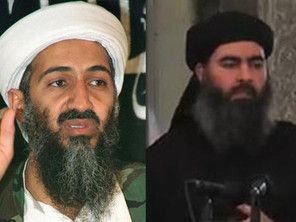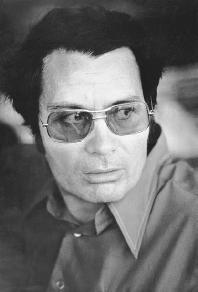Attention
The Psychology of Terrorists (Pt. 3): The Messiah Syndrome
Does Al-Baghdadi, like bin-Laden before him, suffer from a messiah complex?
Posted September 29, 2014

As stated in my previous post, I view Abu Bakr Al-Baghdadi, like his predecessor Osama bin Laden, as a religious fundamentalist cult leader with a major messiah complex. But what exactly is a "messiah complex"?
Carl Jung is credited with first introducing the term "complex" into the psychoanalytic lexicon. Prior to Jung's relatively brief but fruitful collaboration with him, Freud utilized an altogether different terminology to denote the now famous "Oedipus complex." Later, Alfred Adler, another of Freud's former followers, introduced the notion of an "inferiority complex."
According to Jung, a complex (e.g., a mother or father complex) is an unconscious constellation of cognitions, memories, images, impulsions, opinions, beliefs, associations and other content emanating from a core or nucleus of repressed or dissociated emotion, drive or instinct. Complexes can behave like relatively autonomous "splinter personalities," powerfully influencing consciousness, cognition, affect and behavior. As Jung once said, we all have complexes; the question is whether we have complexes or they have us.
Complexes contain archetypal images that lie latent in the unconscious until being somehow stimulated or triggered, at which time they can, in certain cases, take complete or partial possession of the personality. The idea and image of Messiah or God appear to be innate (archetypal) potentialities in the human psyche. When activation occurs, some confused individuals completely misidentify themselves with this archetypal image, resulting in a dangerous form of ego-inflation seen typically in schizophrenic patients, or those suffering from delusional disorder or severe manic episodes. This same dynamic can also occur in those with paranoid personality disorder or severe narcissistic personality disorder.
In schizophrenia--and the psychoses in general--the  phenomenon of what we clinicians call "religious preoccupation" is striking: Psychotic patients regularly report hearing the voice of God or the Devil. Persecutory paranoia can accompany such dangerous states of mind, and is typically the source of supposed defensive violence by cults toward demonized non-believers or outsiders. Rev. Jim Jones, the paranoid spiritual leader of the People's Temple, who claimed to be both Jesus and Buddha, led 914 of his tragically mesmerized followers--including 276 innocent children--to mass murder-suicide in 1978. Marshall Applewhite similarly proclaimed himself a messiah and predicted doomsday, eventually leading his Heaven's Gate cult to mass suicide in 1997. In 1993, seventy-four members of David Koresh's heavily armed fundamentalist cult, the Branch Davidians, died a fiery death in a furious shootout with government agents in Waco, Texas. Koresh, who never knew his father, perhaps seeking one instead in Jesus Christ, fancied himself the "final prophet." In each of these tragic cases exemplifying the messiah syndrome, the cult members and leaders were convinced that death would lead to glory and a better afterlife, to Heaven, much as in the case of Islamist terrorists like ISIS and Al-Qaeda.
phenomenon of what we clinicians call "religious preoccupation" is striking: Psychotic patients regularly report hearing the voice of God or the Devil. Persecutory paranoia can accompany such dangerous states of mind, and is typically the source of supposed defensive violence by cults toward demonized non-believers or outsiders. Rev. Jim Jones, the paranoid spiritual leader of the People's Temple, who claimed to be both Jesus and Buddha, led 914 of his tragically mesmerized followers--including 276 innocent children--to mass murder-suicide in 1978. Marshall Applewhite similarly proclaimed himself a messiah and predicted doomsday, eventually leading his Heaven's Gate cult to mass suicide in 1997. In 1993, seventy-four members of David Koresh's heavily armed fundamentalist cult, the Branch Davidians, died a fiery death in a furious shootout with government agents in Waco, Texas. Koresh, who never knew his father, perhaps seeking one instead in Jesus Christ, fancied himself the "final prophet." In each of these tragic cases exemplifying the messiah syndrome, the cult members and leaders were convinced that death would lead to glory and a better afterlife, to Heaven, much as in the case of Islamist terrorists like ISIS and Al-Qaeda.
Like convicted mass murderer Charles Manson, Koresh's grandiose dreams of being a rock star in this life were crushed after coming to Hollywood. Fame eluded them. Their compensatory narcissistic fantasies were frustrated. Their inflated egos wounded. What followed in both cases was a bloody and embittered reaction to feelings of frustration, narcissistic injury and rejection, one that lashed out against the world in a relentless pursuit of destructive infamy, fueled by a wicked rage for recognition. 
From the perspective of existential psychology, the Messiah phenomenon can be understood as part of the eternal and universal search for the "ultimate rescuer": an omnipotent and omnisicent force or being that loves and protects us. The ultimate rescuer saves us from our existential aloneness, freedom, anxiety, responsibility to think for ourselves and decide on our own behavior, and provides hope and meaning to counteract our lack of purpose in life and despair. Though an ultimate rescuer may be construed in many forms (including in the case of so-called positive transference in psychotherapy), magical powers are projected onto the person of the cult leader or messiah, accompanied by a surrender of one's personal will and ego to the messianic leader and the collective needs of the cult. This gives followers of the messiah an opportunity to transcend their own individual egos and to function as part of something greater than themselves. In this sense, participants in the messiah syndrome seek spirituality, some way of transcending their sense of meaninglessness, powerlessness, helplessness, and isolation. Sadly, for Islamic terrorists and other messianic cult members, including Satanists, this is a tragically misdirected, desperate effort to find some sense of personal significance, belonging, empowerment and connection with the transpersonal realm. In religious or metaphorical terms, this deadly messiah syndrome is tantamount to a pact with the Devil, and provides a rationalization and excuse for committing evil deeds in the name of cult and cause.
We all have a "messiah complex" dwelling deep within. But not everyone becomes completely possessed and grandiosely inflated by it. The desire to redeem and "save the world," when kept in check, can be a very positive force in life, motivating us to do good deeds and to leave the world a better place--if only infinitesimally--than when we came into it. But when one has been chronically frustrated in realizing this positive, creative potentiality, it remains stillborn in the unconscious, dissociated from the personality, rendering them highly susceptible to possession by the messiah complex. This is especially true when the sense of self has been underdeveloped or weakened due to trauma and other early narcissistic wounding.

Messianic religious sects like Al-Qaeda and ISIS are not unlike the psychedelic cult or "Family" that unquestioningly served and worshipped Charles Manson, obediently butchering the pregnant Sharon Tate and eight others at his bidding in the summer of 1969. Manson was convinced that by instigating a race war in America as a result of the random killings, he and his group would seize power in the ensuing pandemonium of "Helter Skelter." This was his own messianic delusion of being a savior, of saving the world. From what I've seen in taped interviews over the years, Manson appears to be at once narcissistically grandiose, intermittently psychotic, paranoid, and profoundly antisocial. He bitterly alleges--with some merit, given his horrific background before the Hollywood massacre-- that the world has done him wrong, which gives him the right to do the world wrong, to commit such evil deeds. This pathological inner rage and narcissistic need for retribution and revenge is at the core of sociopathy--which is why I refer to antisocial personality disorder and what I call "psychopathic narcissism" (see my prior post) as really an anger disorder.
Manson, like Koresh, never knew his father. His mother was an alcoholic and possible prostitute who physically neglected, rejected, abused and abandoned him. In and out of juvenile detention since he was twelve--closely fitting the profile of so many antisocial characters-- Manson became a career criminal who has spent the bulk of his adult life behind bars. He is reported to have had an intense need to call attention to himself as a child and adolescent. But, never receiving such love and attention from his parents, Manson sought it, like most children in such circumstances do, by engaging in negative behavior. In adulthood, having failed to do so constructively or creatively through music or otherwise, Manson (and Koresh) eventually succeeded in finding the fame and acceptance they desperately desired destructively via their evil deeds.
We know that children who are frustrated in getting the positive attention and fulfillment of healthy narcissism they naturally need will turn to negative attention-getting behaviors as a substitute for positive or no attention at all. Manson himself admits "I'm still a little five-year-old kid." This is psychologically accurate: Manson, like most other messianic cult leaders, is basically an abandoned, damaged, deeply hurt, angry, resentful, fearful little boy who feels unloved and unlovable. By becoming cult leaders, they receive the unconditional love, attention and acceptance from their followers they always craved. And they can act out their infantile fantasies of omnipotence, power and control.
I suspect terrorist leaders like bin Laden and al-Baghdadi share similar states of mind with other infamous cult figures, including "polygamist prophet" Warren Jeffs and self-proclaimed messiah Michael Travesser (Wayne Bent). Certainly, bin Laden saw himself as a messiah, the savior of his own Muslim people, and perhaps, of humanity. Adolf Hitler, another messianic cult leader, also viewed himself this way, as did the entire German nation, following him blindly into a catastrophic World War with millions of casualties. Psychoanalyst Michael Stone (1991) notes that Hitler's father brutally beat both him and his brother daily with a whip, suggesting that Hitler's evil deeds (and his notorious "anger attacks") were, at least in part, a consequence of this physical and emotional abuse: a hateful--and, ironically, hypersadistic--displaced expression of repressed rage regarding his frustrating relationship with his sadistic father.
In Jungian terms, both al-Baghdadi and bin Laden may be classic cases of inflation: a pathological over-identification with the Messiah archetype, the universally innate image of an embodied savior or chosen one. Many religions share this archetypal concept of Messiah, including Christianity, Judaism and Islam. In Christianity, the negative counterpart to the Messiah is the Antichrist. Much like the archetypal notion of God, identifying oneself as God or Messiah is a disastrous form of ego-inflation. Such inflation is a grandiose narcissistic defense against profound feelings of inferiority and powerlessness. The wounded ego, with its debilitating, neurotic feelings of guilt, badness, shame, emptiness, unworthiness and helplessness falls prey to the equally neurotic (or psychotic) compensatory spiritual pride the ancient Greeks called hubris, providing self-righteous justification for evil deeds. In this sense, the would-be messiah or savior turns instead into the Christian Antichrist or Islam's Masih ad-Dajjal, the false messiah, the embodiment of all evil.




